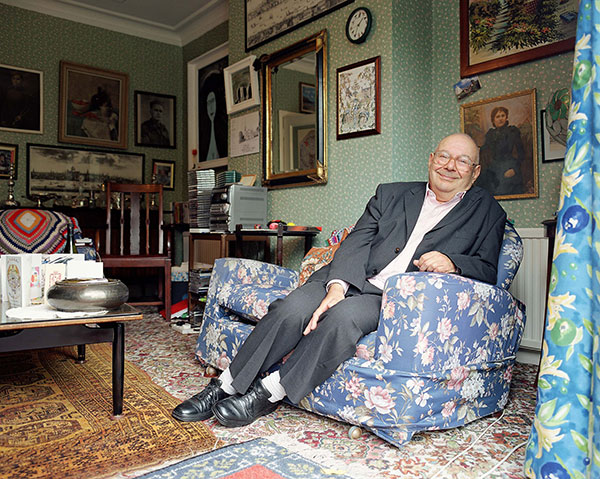If the past year has taught us anything, it is to savour every kind of entertainment we can enjoy from home, be it via the TV, radio or internet. Radio holds a special place in my heart, a love affair which began in earnest when, aged just eight, I won a brand new Bush radio in a raffle (with…
The Christopher Boy’s Communion ★★★★
How the BBC is marking Holocaust Memorial Day
Rabbi Lionel Blue has died aged 86 – Judi Herman remembers two encounters with him in the last months of his life
 There will be beautiful, insightful and loving obituaries about Rabbi Lionel Blue, the much loved minister, teacher and, famously, speaker on BBC Radio 4's Thought for the Day, from those who knew and loved him well over many years. He was known for his jokes, his insights and his honesty about his homosexuality. Sadly he passed away on Monday 19 December, aged 86. I myself encountered Lionel only at the very end of his life, when he was living in a home in Golders Green, coping with the ravages of Parkinson’s Disease, the cruel condition that rendered it so hard for this extraordinary communicator to do just that, for it made not only movement but also speaking extraordinarily difficult.
There will be beautiful, insightful and loving obituaries about Rabbi Lionel Blue, the much loved minister, teacher and, famously, speaker on BBC Radio 4's Thought for the Day, from those who knew and loved him well over many years. He was known for his jokes, his insights and his honesty about his homosexuality. Sadly he passed away on Monday 19 December, aged 86. I myself encountered Lionel only at the very end of his life, when he was living in a home in Golders Green, coping with the ravages of Parkinson’s Disease, the cruel condition that rendered it so hard for this extraordinary communicator to do just that, for it made not only movement but also speaking extraordinarily difficult.
Last summer I was asked to write a light-hearted tribute to the Leo Baeck College for training Liberal and Reform Rabbis as it turned 60 this year, to be performed at the Liberal Jewish Biennial Conference. I was sent to record Lionel telling one of his trade mark jokes and with extreme effort and gumption he did just that. He also had a great deal to say about his time at the college, of which he was one of the very first two students and that had pride of place in the article I wrote about Leo Baeck College in the October 2016 issue of Jewish Renaissance.
But afterwards he continued to chat to me and I continued to record what he said as I leant close, straining to catch his words. He spoke of being a pioneer, bringing word from the frontier of old age. “My great problems,” he said, “are not the problems of the past but of the future. My problem and the problem of my generation is we are living longer. In my childhood my parents died when they were about 60. Now [people] carry on till they are 80 or 90 and you need a whole new interpretation of Jewish life for them because otherwise you just go round and round and round the same bush. That doesn’t help you very much. For example, I have to ask myself what is the purpose of life for me in an old-age home? That’s what I’m trying to work out here now. I’ve worked out parts of it.”
He paused and I asked, rather simplistically and fatuously, I admit, whether he thought he had something to add to Jewish learning on extended old age now.
“Not to add,” he replied, gently humouring me. “First of all I’d want to know what it is to be an old chap.”
Will you share it with us when you know?
“Of course!” Poignantly he continued: “But the point is you have to learn what it’s like to feel the loneliness of old age even with all the nice pressies you get. What’s the purpose of lingering around being an old person? It’s not easy to find out, but I think that’s what we’ve got to do.”
I continued with a whole lot of guff along the lines of, "Maybe you are like the two spies who went into the Land – you’re going before us and you’re going to give us a message that will make it more understandable.”
Softly sending me up again he replied: “The message is you tend to have too many cakes!”
That wasn’t the last time I visited Lionel. He’d told me during that recording about his love of dogs and how he missed being able to stroke and pet them. I wondered whether I might bring my dog, Bertie the Bedlington terrier to meet him. Reminded of my idea when I saw Lionel again, a guest of honour at the Service of Celebration for Leo Baeck College’s 60th anniversary, I asked if he’d like to meet Bertie and when he said yes, I asked the kind folk who ran the home whether Bertie might visit. To my delight and Lionel’s – the answer was "why not!"
So last month one very excited Bedlington had to learn to restrain himself as he jumped enthusiastically at Lionel and enjoyed being petted by a tentative hand. Bertie is probably not quite up to qualifying as a Pets as Therapy dog, but I like to think he felt the greatness and gentleness of the man in the chair at whose feet he eventually fell asleep. Now Lionel is free of the loneliness, and the pain and frustration he seemed to bear with such grace, outwardly at least. z”l (zichrono livrakha – may his memory be a blessing).
By Judi Herman




